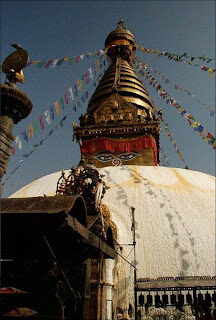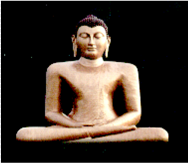Where you not even aware that Buddhism has missionaries? They certainly do, and the ones to reach the USA set into motion a master plan that has worked wonders.

The magazine, Tricycle – The Buddhist Review, reprinted the text of an article from The San Francisco Chronicle dated Sep. 12, 1899 in which two Buddhist missionaries were interviewed.1 These two priests, Dr. Shuye Sonoda and Rev. Kahuryo Nishihima, were the first missionaries of the Jodo Shinshu (Pure Land) sect of Japanese Buddhism to conduct missionary activities in the USA.
First we hear from the writer of the original article who states that the missionaries have come to “minister to the spiritual wants of their country men and at the same time to undertake the work of converting the Christians of this city to their faith.” Dr. Shuye Sonoda will substantiate this fact.The Buddhist priests established a missionary outpost in which “religious services will be held every Sabbath, for they are willing to conform to the national day of worship.” As will be made clear, this was not merely them conforming to us but it was a way in which to fit in and make conversion more palatable.The writer continues, “from this as a center it is proposed to circulate printed tracts which shall set forth the merits and beauties of the ancient Buddhist faith, as compared to the doctrines of Christianity.”
Thus, it began with not simply a Buddhist statement of faith but with a comparison which is meant to demonstrate Buddhism’s superiority over Christianity.
Next Dr. Sonoda describes their mission, “Our primary object is to instruct the Japanese who are here, but that is not our goal, but merely a preliminary step, which we shall follow with the circulation of pamphlets among Americans, setting forth the meaning of Buddhism_Our plan here is first to establish a church, then an evening school for our own people, and as we become more proficient in English, to communicate with those among Americans who wish to investigate Buddhism.”
He continues by setting forth some beliefs of Buddhism, “We believe that we are governed only by law, not by any personified God. We have within us the highest guidance, the Kharma. Before people can comprehend the truth they must be freed from delusion.”What is the delusion of which he speaks?
“God is not the creator, but the created. We ourselves create God. He is not a real existence, but a figment of the human imagination.”
Have you ever heard the saying, the problem with a self made man is that he worships his creator? Since there is no God and since we humans are deluding ourselves by relying on this figment what are we to do? Dr. Sonoda states, “we must remove our own imperfections, relying on no other power.” It is true that atheists, be they ancient Buddhists or modern day secularists, certainly believe that theism of any sort is non-but escapism. Yet, the reality is that it has been mankind’s attempts at self-will, self-rule, self-ownership that is the delusion and the root of all evil.
Finally, we get at the bottom line of their mission of proselytizing,
“I firmly believe that Buddhism is a better moral guide than Christianity.”
Consider the contemporary results of the missionary’s work. U.S. News & World Report, reporting on religious matters told of a woman who, “Though she attends her parish church with her husband and children” she “visits a meditation center regularly and has joined a Buddhist-Christian dialogue group.” A Buddhist-Christian dialogue sounds like a great idea. However, she states, “There isn’t an either-or mentality, which is part of its appeal.”2
How there can be no either-or mentality is a mystery? This is because Buddhism believes that there is no God and Christianity believes that there most certainly is a God; this is the epitome of either-or. Stating that Buddhism is a better moral guide than Christianity was certainly an either-or conception.
Consider also that it was stated that she attends a meditation center but again there are vast differences in defining common terminology. Meditation, according to Christianity is contemplating God’s word and deeds while according to Buddhism it is to attempt to rid ourselves of Karma by becoming completely unmoved by joy or sorrow, to become so completely removed from the real world that you do not accumulate good or bad Karma, by being utterly neutral to everything, unthinking and unfeeling.
We should learn to get along while disagreeing, if need be, instead of watering down our beliefs in order to make it seem as if there is agreement where there is little or none.
One interesting thing to point out is that Dr. Sonoda has a doctorate degree in philosophy. This is interesting because Buddhism completely rejects any rational thought process. Indeed, any intellectualization is utterly shunned by Buddhism and is actually seen as a barrier to enlightenment.
When one thinks of Buddhism, one generally thinks of Japan and China. The most well known form of Buddhism perhaps being Zen in Japan, which corresponds to Ch’an in China. However, Buddhism was founded by Siddhartha Gautama who was Indian. One of China’s revered figures is Bodhidharma, or Ta-Mo, he is considered the 28th patriarch of Indian Buddhism. He arrived in China in 475 AD as a Buddhist missionary and is seen as being responsible for establishing certain practices upon which systems of Martial Arts were founded.
“Not only does Buddhism not prohibit proselytization, the Sinhalese traditional history of Buddhism in Sri Lanka begins with the arrival from India in the 3rd Century BCE of Mahinda and six missionary companions sent by the Mauryan emperor to proselytize and convert King Devanampiya Tissa and the nobility.”3
In Buddhism and Peace, N. Jayatileke wrote, “Buddhism is the first missionary religion in the history of humanity with a universal message of salvation for all mankind. The Buddha after his Enlightenment sent out sixty-one disciples in different directions asking them to preach the doctrine for the weal and welfare of mankind.”4

Here are either-or statements by other Buddhists regarding their concept of God, or lack thereof:
“Buddhists do not believe in a personal creator God. The idea that a supreme being made everything which consequently makes us mere puppets of his will is rejected by the Buddha_the Buddha never denied the existence of morally perfect gods such as Brahma or a hierarchy of Brahmas. But as to their being omniscient and omnipotent, the Buddha didn’t buy that.”5
“Buddhists understand the universe and God as one. All life is one, therefore, there cannot be God and man nor a universe and God. A god not in the world is a false god, and a world not in God is unreal_the universe is God and God is the universe. To say that God created the universe, and then to say that he stands outside this universe is a contradiction_
We create the world each moment of each day. When we are asleep, there is nothing, but once we are awake, then the world of form, color, odor, taste and touch are instantly created by our senses. Buddhists see the world as a phenomenon of flux consisting of various relations, but not created by some divinity_
If you think that this world is created by a supreme being, then you must feel that you are powerless to change anything, thus leaving your fate to the mercy of that creator. Buddhists know that the world is your own production. You may change it, rebuild it or improve it to suit your own will.”6
“Buddhism places the center of the universe in the subjectivity of individual mind, whereas other religions put it in the objectivity outside the individual mind_What is the first cause, the very beginning of everything? Some religions answer God, Allah, Brahma, or something outside the individual. Buddhism sweeps aside your idle speculation and tells you to find the answer in your own realization_
Buddhism does not ask you to believe that you yourself are the creator_but it does promise that when you have fulfilled the requirements, you will know the answer beyond the shadow of a doubt.”7
“The Buddha was not a god and the philosophy of Buddhism does not entail any theistic world-view.”8

If you think that you have the truth you aught to share it and we aught not besmirch one religion more than another with regards to missionary zeal. The only way that a religion grows beyond the mind of its founder is when one person shares it with another.
